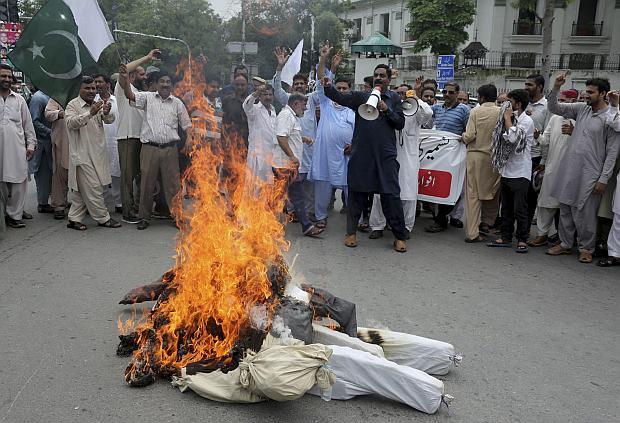
Pakistani clerks shout anti-India slogans after burning effigies of Indian Prime Minister Narendra Modi during a protest to express support and solidarity with Indian Kashmiri people in their peaceful struggle for their right to self-determination, in Lahore, Pakistan, Tuesday, Aug. 6, 2019. India’s government has revoked disputed Kashmir’s special status by a presidential order as thousands of troops patrolled and internet and phone services were suspended in the region where most people oppose Indian rule. (Photo by K.M. CHAUDARY / AP)
NEW DELHI — India’s lower house of Parliament was set to ratify a bill Tuesday downgrading the governance of the Indian-administered portion of Muslim-majority Kashmir, as an indefinite security lockdown continued in the disputed Himalayan region.
Prime Minister Narendra Modi’s Hindu nationalist government submitted the Jammu and Kashmir Reorganization Bill for a vote by the Lok Sahba a day after the measure was introduced alongside a presidential order dissolving a constitutional provision that gave Kashmiris exclusive hereditary rights and a separate constitution.
The situation in Kashmir was unclear after the government shut off most communication with it, including internet, cellphone and landline networks. Thousands of troops were deployed to the restive region amid fears the government’s steps could spark unrest.
Indian TV news channels showed security personnel including armed soldiers in camouflage standing near barbed wire barricades in the otherwise empty streets of Srinagar, Kashmir’s main city.
Jammu and Kashmir Director General of Police Dilbagh Singh said Srinagar is “totally peaceful,” the Press Trust of India news agency reported.
The lower house was expected to easily ratify the bill downgrading Kashmir from a state to a union territory with a legislature and carving out Buddhist-majority Ladakh, a pristine, sparsely populated area that stretches from the Siachen Glacier to the Himalayas, as a separate union territory without a legislature.
Parliament’s upper house approved the bill by a two-thirds majority, with many opposition lawmakers voting with the ruling Hindu-nationalist Bharatiya Janata Party.
Residents of Ladakh, many of whom had been asking for union territory status, also reported intermittent communication blocks.
Tensions also have soared along the Line of Control, the volatile, highly militarized frontier that divides Kashmir between India and Pakistan, which both claim the entire region.
Pakistan President Arif Alvi convened his country’s parliament to discuss India’s surprise actions on Kashmir. Pakistan’s foreign minister earlier denounced the Indian measures and appealed to the United Nations in a letter Monday to send a fact-finding mission.
Pakistan’s parliament was expected to unanimously adopt a resolution later Tuesday rejecting the revocation of Indian-controlled Kashmir’s special status despite objections from opposition lawmakers that the resolution had not originally appeared on the agenda, forcing the speaker to briefly adjourn the meeting.
Meanwhile, Pakistan’s top military commanders were meeting in the garrison city of Rawalpindi to discuss the changes in Kashmir.
The Pakistani military was on high alert following reports that New Delhi was continuing to dispatch additional troops to the region.
U.N. Secretary-General Antonio Guterres urged all parties to show restraint, spokesman Stephane Dujarric said Monday.
“We are following with concern the tense situation in the region,” Dujarric said. “We’re also aware of reports of restrictions on the Indian side of Kashmir, and we urge all parties to exercise restraint.”
/atm